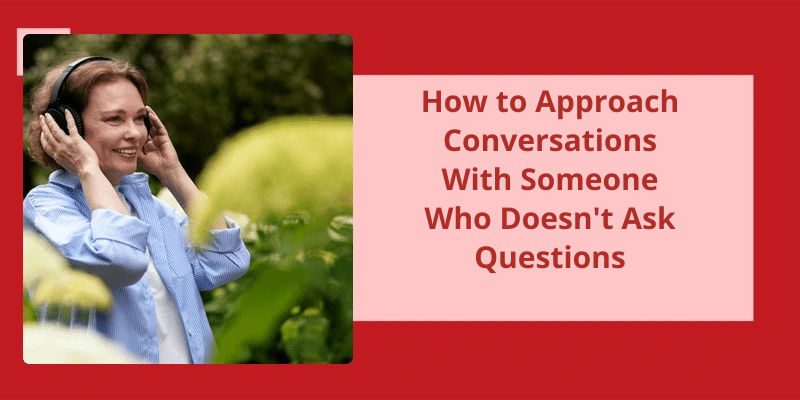As social creatures, we often seek out conversations with others to connect, share ideas, and learn from one another. However, what happens when we encounter individuals who don’t ask questions in return? These individuals may respond to our prompts with surface-level, one-word answers, leaving us feeling frustrated and unacknowledged. It can be challenging to navigate these conversations, as it requires a different approach to keep them engaged and potentially spark deeper discussions. Whether it be a colleague, friend, or family member, the art of conversing with someone who doesn't ask questions can be a valuable skill to hone in various social situations.
Why Do Some People Not Ask Questions in Conversations?
Others may not ask questions in conversations because theyre simply not interested in what you’ve to say. It could be that theyre absorbed in their own thoughts or in their own world, or they may be preoccupied with something else entirely. Either way, it can be frustrating when youre trying to engage with them and theyre not reciprocating.
This can be a bit presumptuous, and can make the other person feel unimportant or undervalued. It can also be a sign of arrogance or a lack of social skills, as it demonstrates a lack of interest in getting to know others and their unique perspectives.
Additionally, some people may not ask questions in conversations because theyre uncomfortable with the level of intimacy that can come from knowing too much about someone else. This can be particularly true in more professional or formal settings, where there may be a desire to maintain a certain level of distance or formality. In these cases, it may be helpful to find ways to break down barriers and build more trust and openness in the conversation.
It’s important to be patient and understanding, and to remember that everyone has their own unique communication style and personality. By being open and respectful, we can create more meaningful and fulfilling conversations, both in our personal and professional lives.
The Benefits of Asking Questions in Communication
- Asking questions encourages active listening
- It helps to clarify understanding of the topic or message
- Questions promote critical thinking
- It establishes rapport and builds relationships
- Asking questions can reveal underlying assumptions and biases
- It allows for more effective problem-solving and decision-making
- Questions can help to facilitate constructive feedback and constructive criticism
- It shows interest and engagement
- Asking questions can lead to increased creativity and innovation
- It helps to avoid miscommunication and misunderstandings
But is it always necessary to ask questions in every conversation? Let’s explore this further.
Should You Always Ask Questions in a Conversation?
It also shows that youre paying attention and want to learn more. People appreciate when others take an interest in their thoughts and experiences, so by asking questions, youre showing that you value their input. This can help to build stronger relationships with colleagues, friends, and even strangers.
Asking questions can also help to clarify information and avoid misunderstandings. If youre unsure about something, asking for clarification can help you to better understand the topic at hand. This can prevent miscommunication and ensure everyone is on the same page. Additionally, by asking questions, you may be able to gain new insights and perspectives that you hadnt considered before.
When you ask questions in a conversation, youre also showing that youre not afraid to admit when you don’t know something. This can be a valuable mindset to have in both personal and professional settings, as it allows you to learn from others and expand your knowledge. By asking questions, youre demonstrating a willingness to learn and grow, which can help you to develop important skills and advance in your career.
Of course, it’s important to strike a balance when it comes to asking questions in conversations. You don’t want to dominate the discussion or come across as confrontational or argumentative. Rather, you should aim to ask questions that are thoughtful and relevant to the topic at hand. This will help to keep the conversation flowing and ensure that everyone feels heard.
Asking questions in conversations can be a powerful tool for building relationships, gaining new insights, and clarifying information. By demonstrating an interest in others thoughts and experiences, you can show that you care and value their input. If youre not already in the habit of asking questions, try incorporating this skill into your conversations and see how it can benefit you.
How to Balance Between Asking Questions and Providing Input in a Conversation?
- Listen carefully to what the other person is saying.
- Ask open-ended questions that allow for further discussion.
- Provide input or your own perspective, but also allow the other person to do the same.
- Avoid interrupting or dominating the conversation.
- Be aware of nonverbal cues and adjust your approach accordingly.
- Try to strike a balance between asking questions and providing input throughout the conversation.
One of the challenges in maintaining a conversation with someone is knowing how to continue it without always having to ask questions. Fortunately, there are a variety of ways to keep the conversation flowing that don’t rely on interrogative statements. Keeping things light and positive can help to establish a comfortable rapport, and sharing personal anecdotes or observations can provide interesting jumping-off points for further discussion. So, how can you keep the conversation going without questions? Let’s explore some options.
How Do You Continue a Conversation Without Questions?
One way to continue a conversation without questions is by sharing a personal experience that you recently had. It can be something as simple as a funny encounter at the grocery store or a meaningful moment with a loved one. By sharing this experience, you invite the other person to participate in the conversation and potentially share their own similar experiences.
Humor is also a great tool for continuing a conversation without questions. Sharing a joke or a meme can lighten the mood and create a relaxed atmosphere. Laughter is contagious and can instantly bring people together, even if they’re strangers.
If you find yourself at a loss for words, try commenting on your surroundings or the current situation. It can be something as simple as remarking on the weather or the decor of the place you’re in. By acknowledging your environment, you create a starting point for further conversation.
Active listening is key to continuing a conversation without questions. By paying attention to what the other person is saying, you can pick up on keywords or phrases that you can expand on. This shows that you’re truly engaged in the conversation and interested in what the other person has to say.
Source: What’re the ways to start a conversation without asking …
Conclusion
In conclusion, communicating with a person who shows little interest in asking questions can be frustrating and challenging. However, it’s important to keep in mind that this behavior may stem from various reasons, such as shyness or lack of social skills. In these cases, a more patient and empathetic approach to the conversation can lead to better results. On the other hand, if the lack of questioning is intentional, it may be necessary to reevaluate the relationship and communication dynamic. Ultimately, effective communication requires mutual engagement and effort from both parties involved. By approaching conversations with an open mind and a willingness to listen and connect, we can foster more meaningful and fulfilling interactions with those around us.






